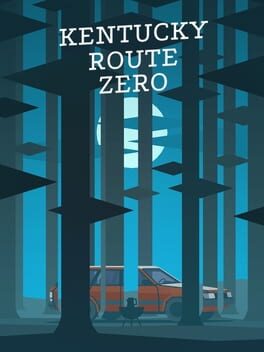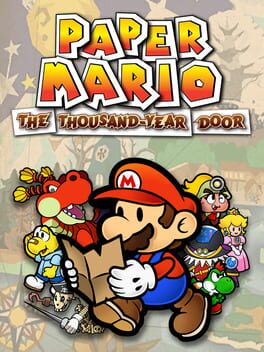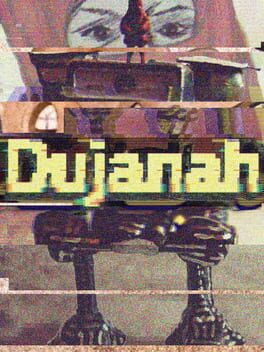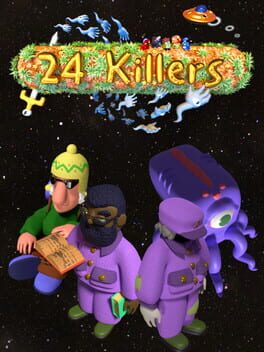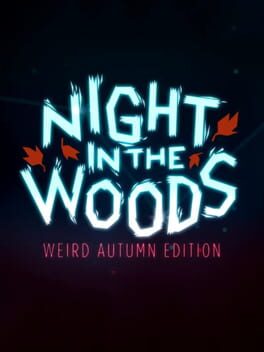QuinnK
Bio
Quinn K. I'm a writer and gamedev.
I rate things after personal enjoyment - none of what I say here is supposed to be taken as aspiring objectivity.
Quinn K. I'm a writer and gamedev.
I rate things after personal enjoyment - none of what I say here is supposed to be taken as aspiring objectivity.
Badges

Gone Gold
Received 5+ likes on a review while featured on the front page

Shreked
Found the secret ogre page

GOTY '23
Participated in the 2023 Game of the Year Event

Trend Setter
Gained 50+ followers

Pinged
Mentioned by another user

Loved
Gained 100+ total review likes

2 Years of Service
Being part of the Backloggd community for 2 years

GOTY '22
Participated in the 2022 Game of the Year Event

Donor
Liked 50+ reviews / lists

Well Written
Gained 10+ likes on a single review

Popular
Gained 15+ followers

Gamer
Played 250+ games

Liked
Gained 10+ total review likes

Best Friends
Become mutual friends with at least 3 others

Noticed
Gained 3+ followers

N00b
Played 100+ games
Favorite Games
367
Total Games Played
000
Played in 2024
107
Games Backloggd
Recently Reviewed See More
mannnn. 24 killers may just be my favourite thing ive played this year so far. and you wouldnt guess it at a superficial glance - it looks fairly quaint if you dont try it for yourself. "a moon rpg clone, a love-de-lic-like"... when people try to capture a game like that, the pigeonholing of it kind of covers up all nuance in a homogenising white paint, huh?
but 24 killers is absolutely not its inspirations - not exclusively. what 24 killers does better than every single other game ive seen (even ones ive spent more time with!) is flavour. everything oozes charme, everyone has personality to spare. its language is almost like a bit of a code - "man" (the interjection) becomes "mon"; "fuck" becomes "foam"; "garbage" is always gabbage. its remarkably consistent, and the grooves of its writing arent disturbing, but familiar and warm.
it is also truly a kind game - kind on your patience, and your time, and your care. it isnt wasteful; when it asks you to wait, it knows you have that moment to spare. its like a long-lost friend that you hit it right back off on your first meeting in ages.
more than any other game ive played in recent years, 24 killers has made me smile wide and giggle adoringly at a funny turn of phrase, or an imaginative design, or a silly character.
yes, it feels sometimes like its held together with duct tape, and some small visual polishes are missing - but rather than take away from it, they betray a humanity, the hands that touched its creation.
i remember when its demo hit during a steam next fest that the developer played it with his son; and even though its a game where people smoke (the moon does, too!) and kalashnikovs are strewn about the place, it feels like it really does suit both the grown-up developer to play it, AND his kid, and anyone at the ages in-between.
thank you, happy shabby games. not shabby at all - youve made me very happy with your little island; it really feels like home.
but 24 killers is absolutely not its inspirations - not exclusively. what 24 killers does better than every single other game ive seen (even ones ive spent more time with!) is flavour. everything oozes charme, everyone has personality to spare. its language is almost like a bit of a code - "man" (the interjection) becomes "mon"; "fuck" becomes "foam"; "garbage" is always gabbage. its remarkably consistent, and the grooves of its writing arent disturbing, but familiar and warm.
it is also truly a kind game - kind on your patience, and your time, and your care. it isnt wasteful; when it asks you to wait, it knows you have that moment to spare. its like a long-lost friend that you hit it right back off on your first meeting in ages.
more than any other game ive played in recent years, 24 killers has made me smile wide and giggle adoringly at a funny turn of phrase, or an imaginative design, or a silly character.
yes, it feels sometimes like its held together with duct tape, and some small visual polishes are missing - but rather than take away from it, they betray a humanity, the hands that touched its creation.
i remember when its demo hit during a steam next fest that the developer played it with his son; and even though its a game where people smoke (the moon does, too!) and kalashnikovs are strewn about the place, it feels like it really does suit both the grown-up developer to play it, AND his kid, and anyone at the ages in-between.
thank you, happy shabby games. not shabby at all - youve made me very happy with your little island; it really feels like home.
This review contains spoilers
you know what? fuck it. spec ops: the line is worth five stars and then some. for a long time i sat on the fence about it, and had it collecting dust, uncommentated, at 4.5 stars - no more.
the fact this game was shuffled out-of-sight by 2k games, that an attempt is being made to erase its existence from the public under dubious pretenses at worst, or that it's been dropped in a double-whammy of corporate greed and convenient timing at best, shows us that this game is just as sorely needed now as it was 12 years ago.
many like to do a little joking about its "look what i made you do"-narrative, but those people are unaware that this precise portrayal of leadership at the hands of a vague authority is part of the point. this is taking down not merely the modern military shooter alone, but the entirety of the military industrial complex and its implications. the game design here is a direct analogue of the military chain of command, and the way it attempts to dissuade individuals and society as a whole from seeking blame in the hands of the actor.
on february 25th 2024, united states airforce member aaron bushnell self-immolated rather than continuing to maintain part in the u.s. military's support of yet another genocide - a genocide funded and fueled by this global force for despicable violence, a genocide committed, in part, with white phosphorous used against a civilian population.
the timing is just a bit TOO on-the-nose. we are supposed to forget that the same thing fuels this propaganda as fuels the systematic dehumanisation and killing of several peoples in asia and africa. spec ops, unlike every single other "modern military shooter", didnt flinch, and didnt lie. and for that, it had to disappear.
this is the only game that had the guts to give the player a gun, and let them shoot at a peaceful civilian population - then stand there with the implications of their actions. no fade-out. no game over. only you and the simulacrum of a dead body.
from the river to the sea, palestine will be free.
the fact this game was shuffled out-of-sight by 2k games, that an attempt is being made to erase its existence from the public under dubious pretenses at worst, or that it's been dropped in a double-whammy of corporate greed and convenient timing at best, shows us that this game is just as sorely needed now as it was 12 years ago.
many like to do a little joking about its "look what i made you do"-narrative, but those people are unaware that this precise portrayal of leadership at the hands of a vague authority is part of the point. this is taking down not merely the modern military shooter alone, but the entirety of the military industrial complex and its implications. the game design here is a direct analogue of the military chain of command, and the way it attempts to dissuade individuals and society as a whole from seeking blame in the hands of the actor.
on february 25th 2024, united states airforce member aaron bushnell self-immolated rather than continuing to maintain part in the u.s. military's support of yet another genocide - a genocide funded and fueled by this global force for despicable violence, a genocide committed, in part, with white phosphorous used against a civilian population.
the timing is just a bit TOO on-the-nose. we are supposed to forget that the same thing fuels this propaganda as fuels the systematic dehumanisation and killing of several peoples in asia and africa. spec ops, unlike every single other "modern military shooter", didnt flinch, and didnt lie. and for that, it had to disappear.
this is the only game that had the guts to give the player a gun, and let them shoot at a peaceful civilian population - then stand there with the implications of their actions. no fade-out. no game over. only you and the simulacrum of a dead body.
from the river to the sea, palestine will be free.
Night in the Woods is a lot to unpack. The story of its creation, of the people who got together to develop it, is a fairly tragic line of inquiry nowadays; a story of passion for creation, sure, but also of abuse, and death, and sickness.
A direct result of the tragedy of its makers is that we will, more than likely, never get a game like it again - Revenant Hill having been cancelled due to Scott Benson's health issues. And while that's a shame, it also makes the fact Night in the Woods happened all the more special. I wish The Glory Society's members only the best.
This game speaks in an intensely true way to the struggles and the soul of the younger generations' early adulthood in this current-day world. In 2017 as beyond, when Weird Autumn Edition finally finished parts of the game that lay incomplete before, the game got at a potent anxiety and its core in my life.
Not only did Mae strongly mirror my struggles with mental health, she also reminded me of how hard I'd fought to fit into society, not succeeding; how, in that situation, some turn to befriend, uphold and be upheld by other outcasts, while others cling to family, and others again slip down a slippery slope and descend into an ideological muck. Seeing people as things; seeing people as shapes. It's a headspace Mae is saved from by her friends, and circumstance - as I was, when it almost happened.
I can't hide what I know is true: Night in the Woods, alongside my studies of history and 1900s European literature, made me an anti-capitalist, and antifascist. I wouldn't be who I am without it; I wouldn't make what I make without it. Its villains are a harrowing portrait of self-interested intentions burning squarely in a hell of their own paving; of the brainrot that is killing the United States and many other places.
It's not a perfect game in its pacing or some of its thematic glue, but ultimately, playing this is very worth it. It's a game that understands, gets it in a way very few other things have since.
A direct result of the tragedy of its makers is that we will, more than likely, never get a game like it again - Revenant Hill having been cancelled due to Scott Benson's health issues. And while that's a shame, it also makes the fact Night in the Woods happened all the more special. I wish The Glory Society's members only the best.
This game speaks in an intensely true way to the struggles and the soul of the younger generations' early adulthood in this current-day world. In 2017 as beyond, when Weird Autumn Edition finally finished parts of the game that lay incomplete before, the game got at a potent anxiety and its core in my life.
Not only did Mae strongly mirror my struggles with mental health, she also reminded me of how hard I'd fought to fit into society, not succeeding; how, in that situation, some turn to befriend, uphold and be upheld by other outcasts, while others cling to family, and others again slip down a slippery slope and descend into an ideological muck. Seeing people as things; seeing people as shapes. It's a headspace Mae is saved from by her friends, and circumstance - as I was, when it almost happened.
I can't hide what I know is true: Night in the Woods, alongside my studies of history and 1900s European literature, made me an anti-capitalist, and antifascist. I wouldn't be who I am without it; I wouldn't make what I make without it. Its villains are a harrowing portrait of self-interested intentions burning squarely in a hell of their own paving; of the brainrot that is killing the United States and many other places.
It's not a perfect game in its pacing or some of its thematic glue, but ultimately, playing this is very worth it. It's a game that understands, gets it in a way very few other things have since.
